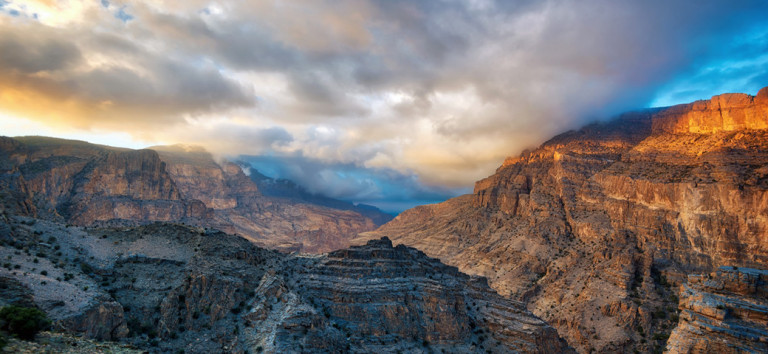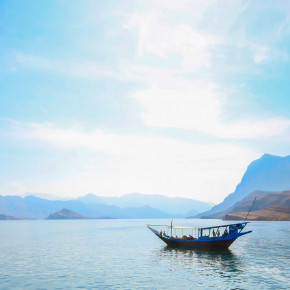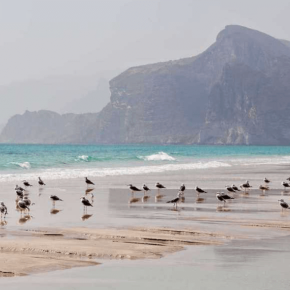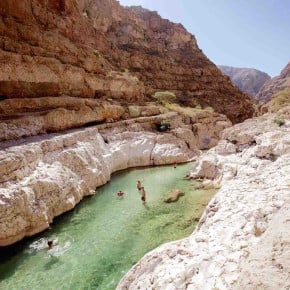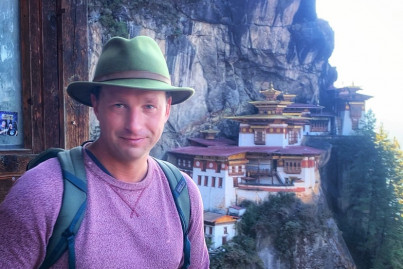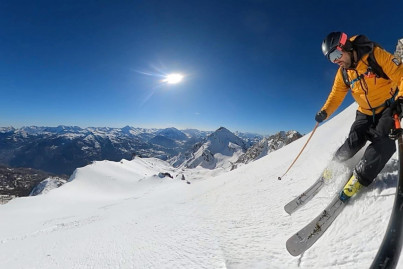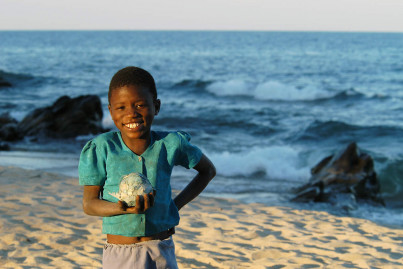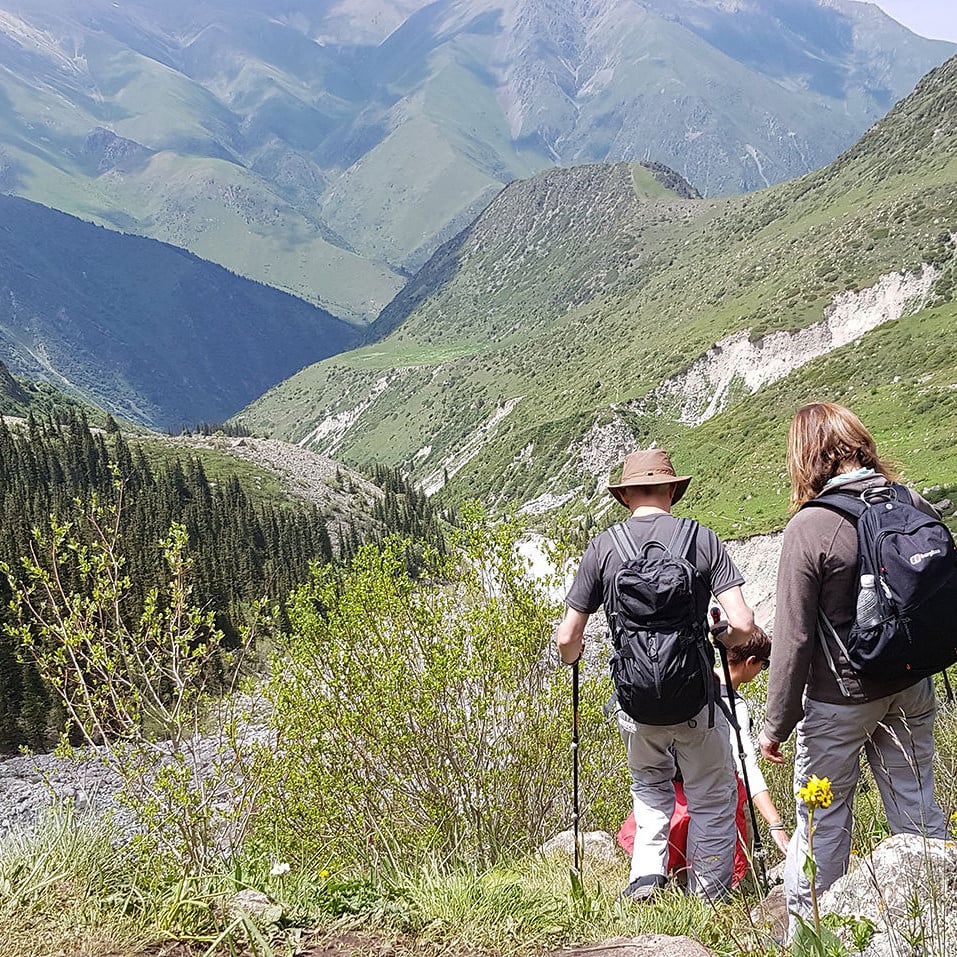Prologue
This account of travelling in Oman contains almost no information about this wonderful country or its welcoming inhabitants, both of which I had the good fortune to experience during a month of wild camping towards the end of 2019. I have never had much imagination as a writer, and can only put down the things that to me were particularly striking at the time – here they mainly record my personal actions and reflections upon needlessly getting into trouble.
I had booked online in advance so when I landed in Muscat’s new cavernous airport, I went straight to the car rental company desk, then up an escalator to the top floor of a carpark simmering beneath a hot sun. I drove my unimpressive KIA Sportage (all they had left after a run on their 4X4 rentals) unthinkingly into the maze of spaghetti tarmac that encircles the city like a cheap doyly, blindly following the satnav and trying not to crash. I had purchased a tiny pathetic excuse for a tent in a gun shop in Beirut and was adamant that I was going to camp my entire stay here this time (about a month). It wasn’t my first time in Oman. When I lived in the neighbouring United Arab Emirates for a couple of years we used to come camping here regularly, and my friend Hamel once lent me his bright red Porsche Carrera and I had driven down from Dubai to Muscat with my girlfriend for a night in what I had then dubbed ‘the city of seduction’.
I had a couple of meetings in Muscat that day with some tour operators. After these had finished and armed with a new Oman country guide filled with highlights and their satellite coordinates, I headed down the coast to find a place to camp. My plan didn’t work however as by the time I pulled into a gas station it was getting dark, and I was so exhausted I had to park nearby and sleep for a few hours in the car. I eventually reached a beautiful small stretch of coast that smelled of fish, but couldn’t find anywhere to camp so spent the night sleeping in the car with the driver’s seat pushed right back, getting bitten by mosquitoes whining through the salt air, listening to hens scratching in a nearby homestead. I was just too tired to care.
Walking in a wadi
In the morning I drove to Wadi Tiwi and when the road narrowed I set off on foot into the winding valley with plenty of fresh water in my backpack. The contradictions of Oman’s natural environment are difficult to capture because of their acute diversity: In this wadi [valley] the chocolate, reddish, orange stone of the high peaks gave way immediately to a lush green fertile strip of palm trees, tall grasses, crops, bushes, flowers and orchards hemmed in by grey stone shingle of river pebbles like a Japanese garden. The road was of a light doughy concrete scarred by linear markings to help the grip of tyres. I plodded up a steep incline past maroon walls of private yet humble houses. I was out of shape after the fleshpots of Beirut, but the bite of familiar muscles felt good as did the pull of the lungs going deeper than of recent weeks, knocking free the pollution of city living. Palm fronds hung seductively over the road framing picture postcard memories of just how good the Middle East can be. I walked on, sweating, without really knowing where I was going.
Reaching the natural end of the valley there was a village and an enterprising Omani showed me the way down through terraced mountainside shadowed by tall wet palms to where the river cut movie set drastic formations into the valley rock. A group of city Omanis clad in rented wetsuits were taking an abseiling lesson. It was a nice spot. I befriended a black American guy who lived in the nearby coastal city of Sur, and we walked back together sharing anecdotes of Middle East expat life that come so easily to the initiated. He showed me the best Indian restaurant in Sur and insisted on paying for the meal as I was his guest. The restaurant had an add-on hotel next door with good wifi so I stayed here a few days working from the hotel lobby drinking coffees and camping on the white sand beach.
Sur
Sur is famous for its Arabian Dow boats, still made in their timeless graceful design from timber and sail. Camping on the beach I could see amorous couples walking along the promenade in the lamplight, yet I was content in my solitary world among the small fishing boats upturned in the sand. I continued driving the next day over a suspension bridge as a dhow lazily sloped beneath me out the estuary to the briny ocean. Three now useless stone castle turrets adorned the mountainside in picture perfect symmetry, remnants of the time when a bullet from a jezail was the law of this land. I followed the tarmac road through a moonscape topography and dropped in to a turtle sanctuary before striking camp in some wretched spot.
I followed the deserted coast round the curve of the easternmost point of the Gulf peninsular and now I was driving west along the southern coast with a view to reaching the port city of Salalah, close to the Yemeni border. I’m not sure I passed another car on this stretch of coastal road. The sea skulked on my left beyond rolling pale gold sand dunes. These same dunes drifted away to my right in an undulating sea of endless waves like a bad special effect from an 80’s sci-fi movie. Windblown trails of sand dusted the tarmac in fleeting kisses and large globules of sand had audaciously spread themselves over the lanes on either side, making me swerve around them as if walking through a party of playing children who aren’t to be minded.
My unthought-through plan to drive to Salalah rapidly receded when I parked next to a camel in the twilight of dusk at the jumping off point to the island of Masirah,and saw from my map that I had only covered a quarter of the distance in a full days driving. ‘No one is going to want to do that’ I thought to myself, and headed North again. But before I would find myself back in the cultural heartlands of Oman, I first had to cross the sun-baked orange sands of the Wahiba. As my Korean 4X4 entered the sandy ruts of a well-used desert road I saw a Jeep Wrangler pass by me in the opposite direction with its roof smashed in, clearly due to being rolled down a sand dune. The Omani driver’s head was poked out the window so he could see past the smashed windscreen, his white teeth flashing in a very pleased-with-himself attitude as his dishdashi flapped in the wind.
A bit of history
Britain and Oman have always shared a strong diplomatic relationship, not least because Oman has been the historic port of call for the trade of arms (notably the Martini-Henry rifle) into the Gulf, of which Britain are willing suppliers. The legendary British explorer Sir Ranulph Fiennes served in the army in Oman from 1968-1970, aiding the Sultan in his skirmishes with the Marxist-indoctrinated guerrillas in Dhofar, the treacherous territory in the south bordering Yemen (previously known as ‘Aden’ at the time of the British Empire). Having read his excellent account of his time fighting here in ‘Where Soldiers Fear To Tread’, I recalled his phrase; “Two thousand years before the Persian hordes who invaded Oman found the heat so great that the jewels fell out of their helmets and the feathers from their arrows.”…
Fortunately now there are some well-run desert camps and I introduced myself as a tour operator (a well-made weighty business card goes far in most places I have found) and was promptly given an exhaustive guided tour of the facilities, situated in the sandy valley between towering perpendicular kilometre-long sand dunes. The tour concluded in the main seating area of a permanent tent housing an enormous hand-woven carpet upon which rich Omani children ran around amusing themselves screaming. I greedily helped myself to some dates and bitter coffee. I didn’t want to drive back yet so I took some water from the car and started walking up one of the souring sandy walls of the natural valley. I was gassing and sweating buckets the whole way up, and at the top I threw up the dates and coffee; such was the strain of ‘two steps up one step back’ in the loose sand under a merciless sun. But the view was worth it. I followed the snaking curves of the ridge of a dune – there were no footprints around of any kind – to the top of a peak of sand to where the camp far below was obliterated from sight. What met my eyes are the dreams of Arabia; the endless “clean” waves of soft golden sand, not littered with pylons or bits of old tyre like in the UAE, but how they have always been.
Driving back along the sandy road I was starting to feel like I was getting the hang of things. Hesitation, like going in for a tackle in a rugby match can be absolutely fatal; you have to pick your line through the sands and just go for it at speed. Natural ruts are formed and you can follow these for a while but they never last. The more I trusted my judgement the more it paid off. Like many things it just takes a bit of getting used to and I was enjoying it with gusto. I got back onto the tarmac and after a minor detour getting lost along some backroads of a nondescript town hanging onto the edge of the desert, I headed back north towards the mountains. I drove for a long time and as it began to get dark, I began to tire and then suddenly I was completely exhausted and realised that driving any further was now dangerous.
Getting into trouble
I could tell I was coming into a city of some description which was the last thing I wanted as I was adamant on my non-hotel policy for this adventure. I suddenly saw a neon-lit sign for ‘Travel Agent’ by the side of the road and pulled off to ask them for a campsite. Two Indian gentlemen were seated at a large desk and once my intentions were known they were met with scathing ridicule of a non-paying affluent customer, upon whom their business depended. They gestured to a dark patch of nothing on the other side of the motorway and this was as good as I was going to get so I made the crossing and drove into the darkness. After a while I pulled off the road in somewhere were there were no lights which felt secluded enough, so I put up my pathetic tent, unrolled my sleeping mat and sleeping bag, stripped down to my underwear in the baking heat and lay down on the bedding in a mental fog of exhaustion.
I should state for the record that Oman is probably the only country in the Middle East where I would camp alone not knowing where I am; such is the good-natured friendliness of its people. Nevertheless, on this particular evening things did not go as smoothly as had hoped. Just as I was dropping off, I was awakened by the lights of a car highlighting the interior of my tent. A driver had obviously seen my camping spot from the road and pulled off for a closer inspection. This was far from ideal, especially as I had no idea where I was. The car eventually left, but I was now spooked. Clearly I was exposed and this dark patch of road was more frequented than I had hoped. But suddenly a plan came to my sleep-deprived befuddled mind; if I parked my 4X4 between my tent and the road no one would see me and just think it was a parked car and I would be ignored – perfect.
I unzipped my tent and skipped out deftly across the sand in my underwear with visions of Richard Burton scaling the wire in The Spy Who Came In from the Cold, such was the cunning of my little foray into espionage. Yet just like the unfortunate Alec Leamas, no sooner had I sat in the driver’s seat and tuned on the engine, the interior of my vehicle was flooded with the while full-beam searchlight of what I sensed to be a Toyota Land Cruiser (I was correct) which had again pulled off the road to interrogate this unwelcome trespasser in foreign lands. A stalemate ensued. There I was, poised in my underpants, highlighted under the full beam of the Nazi guards, with my head on the steering wheel cursing my luck. In truth, even in that moment I couldn’t help but see the funny side of the situation, although of course I didn’t know how it was going to play out…
In a quick assessment of the situation I deduced that my number one priority was to get some clothes on. The stalemate continued; there was no movement from the car, no doors were opening and I was still bathed in light and all my clothes were in the tent. There was nothing for it – I opened the driver’s door and strode out Bold As Brass in my pants to my tent where I hastily pulled on some clothes then without skipping a beat I strode over to the Toyota loudly shouting the customary welcome greetings in Arabic. As soon as I came up beside the Land Cruiser my adrenaline dipped as I could tell that the five Omani men seated in the car in white dishdashi wearing rounded ornately woven circular caps with shining rounded flecks of mirror embraided into the design were not of a malicious nature. They were as perturbed as to my being there as I was of them.
In the ensuing confusion of Arabic and English laid forth from both sides, it was concluded that I could not camp here and they would show me to a more suitable spot as they owned this land and it was too close to their house (there was no house in sight). I was in no position to argue and packed everything back into my car and followed them a kilometre down the road and camped in an identical stretch of barren desert close to the road where I remained unmolested for the rest of the night in the deepest of sleeps. A lot of driving and a few minor adventures eventually brought me to Jebel Akhdar [the green mountains] which I explored for a few days.
Misfat Al Breyeen
One of my favourite places is Oman is the ancient village of Misfat Al Breyeen, nestled at the foot of the mountains of the sun. I parked alongside a couple of vans laden with German and Swiss tourists emptying out to see the town, which at first made me uneasy, but like the Himalayas, when something is worth seeing you cannot begrudge others wanting to do the same. Walking along the terraced date palms along the tinkling waterways of the falaj irrigation networks I quickly lost the crowds however, and I felt the ancient feeling of calm that only nature can evoke. I lazily followed a path up towards a mountain valley out of the village. Two Omani boys came bolting past me chasing a donkey on the loose.
I started chatting in halting Arabic to two young Omani men I met on the path, clad in the pure white dishdashi, but with their heads bare. One worked for a local oil company and the other was in the army. They were cousins. The man in the army was married and the other, more portly than his cousin, was ‘looking for a woman’. We befriended each other in the easy way of the Gulf, and spent the rest of the afternoon together exploring the beautiful plantation of this hidden oasis. When tired we headed back to the stone-built town and were invited for coffee and dates by a local headman there. He refused payment of any kind from any of us. I kept looking under sofa cushions, over balconies and under coffee cups for a women for our oil-worker friend (his iphone was full of pictures of Omani women) which had everyone in hysterics.
Sometime later I was driving along one of the steepest mountain road I have ever been down, which leads to Wadi Bani Awf or ‘Snake Canyon’, that dissects the souring Hajar Mountains to the west of Muscat like the ugly cleft of a jagged sword. I eventually reached the pebbly valley of the riverbed and parked up, glad to still be alive and using my feet like God intended. I took off my shoes and waded into the waist-high waters of the canyon through two perfectly vertical walls of rock like the entrance to some hidden kingdom of Middle Earth. The canyon is very difficult to traverse and forked as soon as I emerged from the long narrow straight pool of water. I chose the right-hand fork and ambled up the unpredictable terrain of fallen boulders, streams, pools, trees, bushes, scrub, vines, shingle and rock at my leisure. After a short amount of time an Omani man and a white German tourist approached me and I could tell something was wrong.
Getting someone out of trouble
The Omani told me that an elderly German lady had broken her ankle “badly” about 40 minutes up the canyon. They didn’t have a phone which I found incredulous. I gave them mine with my local Omani SIM and he called for a mountain rescue ambulance. I also then called a local contact we use for hikes in this canyon and they informed me that there was no helicopter access in the canyon and that the 4X4 ambulance would be coming from Muscat wouldn’t arrive for an hour at the earliest, and they would still have to climb up and bring her out. I figured we still had another 90 minutes of daylight. I wasn’t worried – the ambulance and professionals were on their way and I was sure the guides would get her down in time.
The Omani and German tourist sped back up the canyon ahead of me whilst I made my way up the canyon at a leisurely pace. I was still sweating however as it was heavy going. I remember thinking that it would be interesting to see how a mountain evacuation was conducted here. When I reached the group the scene that met my eyes was of a vastly different nature however. The lady was in a wetsuit, supposedly being carried by four Omani men, sitting on their interlaced hands, but they just weren’t getting anywhere. They had moved her a total of twenty meters in the last hour and she was now freezing cold and shivering. The foot connected to the broken (shattered) ankle was still in its trainer and was flopping around like the head of a drunk, causing god knows what further damage. There was a handful of mainly City-Indian tourists in wetsuits scattered around, completely unused to the terrain and barely able to look after themselves. I very quickly realised that this woman was in very real danger of death from hypothermia and shock, and would almost certainly die if she didn’t get out of the canyon by nightfall. We had about an hour of daylight left.
Before heading to Lebanon I had attended an outdoor first aid course near Poole in Dorset (UK) at the behest of Cathy our Head of Operations. The scenarios acted out in green fields next to ambivalent cows now kicked in and I removed her trainer, made a splint from two strong pieces of wood lying about and secured the foot and ankle with a strong bandage. I still felt like the guides could get her out but after a further ten minutes when it was clear they couldn’t move her, and it transpired that they were not in fact qualified guides, I just put her on my back and walked her out of there. My dad was a paratrooper in the army and growing up as a child he always repeated the phrase “It’s good training” whenever something was difficult – especially when on long walks or camping. I had always taken this as gospel and have taken a bizarre pleasure over the years of carrying loads heavier than needed on hikes in Ethiopia or Kyrgyzstan to name but a few. These words came into my mind at this point and I just smiled. Honestly after all those heavy rucksacks it was no bother – I just carried her out of there for about forty-five minutes and put her in her car. Her friends said thank you and gave me an orange and as I walked back I saw the 4X4 ambulance coming with blue lights flashing in the twilight and waved them in the direction of her and then went to sleep in my tent pitched over some rocks in the valley feeling useful.
Epilogue
I met Sir Ranulph Fiennes exactly one month later after all this took place at London Olympia at the Adventure Travel Show, where we were both giving talks on our respective misadventures. This historic meeting took place at the urinals in the toilets where we were standing next to each other. I had read that he had had to remove some of his fingers due to frostbite, but was hesitant to actually look over and verify this for obvious reasons.
